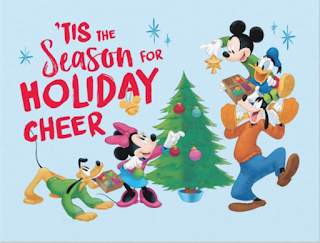“I’m not sure what to use for Christmas cards this year. It really hasn’t been a very good year.”
So my wife told me yesterday. I figure she’s right. After all, we’ve had an impeachment, near-war in Iran, murder hornets, a massive pandemic, the horrible death of George Floyd and the unrest and racial reckoning that followed, human rights violations in China, apocalyptic wildfires in Australia and California, enough hurricanes to exhaust the alphabet, and a bitterly divisive campaign season and election. After all of that, it seems a little… off to send a card like this:
Hmm. “Adventure” is certainly one way of describing 2020.
And Disney cartoons just aren’t doing much for me right now.
Even more neutral cards can feel off when many people (including my own family) aren’t able to enjoy all of the family-and-friends gatherings that they’re used to.
I definitely get where my wife is coming from.
Coincidentally, while reading the news yesterday, I saw a quote from a Washington Post opinion piece, “Prominent evangelicals are directing Trump’s sinking ship. That feeds doubts about religion,” by Michael Gerson. I should mention at this point that I don’t normally read The Washington Post. I have nothing in particular against it, but they have a perfectly reasonable policy of asking people to pay to read their articles, and I’m a cheapskate. And I’m consciously trying to cut back on my news media consumption, because I don’t think a steady diet of reading about whatever partisan conflict of the day is very good for my peace of mind. But the article piqued my interest, so I read it. I expected more punditry about the latest claims and counterclaims of Trump’s election loss, and that’s how the article started. Then it took a hard right turn, however:
For me, doubt is like staring into an abyss. The triumph of doubt involves a downward spiral of consequences. Without a transcendent moral order, ideas such as good and evil, noble and ignoble, are pegged in mid-air. Yes, it is possible to live honorably in revolt against a meaningless universe. But it is also possible to live dishonorably with the same justification. If raw matter is all that is, ideals such as justice are ultimately rootless…
If Christianity were judged entirely by the quality of Christians, it would be a tough sell — and I include myself in the judgment. Most of us are a jumble of resentments and fears. Most of us can be proud, cruel, foolish and self-deluding.
The best response is found in Advent. The most reassuring message of the season is that the existence of hope does not depend on us. It does not rely on our virtue or wisdom. It is a delivery from elsewhere. The German theologian Dietrich Bonhoeffer — who knew something of the subject — compared Advent to a prison cell “in which one waits and hopes and does various unessential things… but is completely dependent on the fact that the door of freedom has to be opened from the outside.”
The Advent narratives are filled with waiting people: Mary, Zechariah, Elizabeth, Simeon, Anna. They lived in patient expectation and were receptive to the Good News when it arrived. Their hope did not come as the result of a battle. It came like a seed planted in the ground. Like the sun rising in defiance of night. Like a child growing within his mother.
We are not the heroes of the story. Our contribution is to be watchful and open. But hope arrives in awesome humility. God is with us. Jesus is with us. This is everything.
So, while Christmas cards are reminding me of the darkness in the world, a political column in a secular newspaper is reminding me of the Light.
My whole life, I’ve treated the month of December as one extended Christmas celebration. There are Christmas lights and decorations and carols and Christmas albums and church pageants and topical sermons and workplace get-togethers and vacations to see family and more. And all of that’s great. Many churches, though, go farther: the season of Advent is formally set aside in their calendars in the four weeks to forty days before Christmas “as a time of expectant waiting and preparation for both the celebration of the Nativity of Christ at Christmas and the return of Christ at the Second Coming” (Wikipedia).
In the darkest month of the year, and in the darkness of 2020, we celebrate Jesus, who “shines in the darkness, and the darkness has not overcome it” (Jn 1:5).
We remember that Jesus responded to the world’s darkness by entering into the world, by experiencing all of the pain and suffering that we do, by taking it upon himself, and by triumphing.
We remember God’s fulfillment of his promise to deliver his people by sending Jesus.
Like Mary, Zechariah, Elizabeth, Simeon, and Anna, we wait for God to fulfill his promise and fully deliver us and make all things right.
And, like them, we can rest in the absolute confidence that he will do so.
Further reading: “What is Advent?”



No comments:
Post a Comment